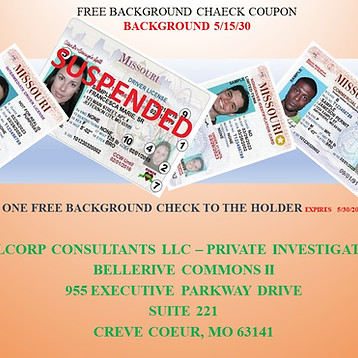What to look for when hiring a P.I. part 2
- Wilcorp Consultants

- Mar 10, 2019
- 3 min read
Updated: Feb 29, 2024
Fr
1. Get a referral. It is likely that you will be sharing personal information with this person and so it important to find someone reliable. Do as much research on the investigator as possible. Ask trusted friends for recommendations and you can search for any local consumer reviews on private investigators. You can, and should, also ask your potential private investigators for references you can call.
2. Check their license. The only states that don't require licensing for private detectives are Idaho, Mississippi, South Dakota and Wyoming, and licensing is voluntary in Colorado. A professional private detective will be able to give you their license number immediately and you can check it with your local municipality to make sure it’s valid, has a matching name to your private detective and if any complaints have been filed against them.
Visit our website to find a link - located at top of home page - to our license: www.wilcorpconsultants.com.
3. Make sure they have an office. If your private detective only works out of restaurants and over the phone, that is a sign you should get out now. You need to know where to find this person if they don’t follow through on their obligations.
4. Ask about their experience and education. To make sure your job gets done right, find a detective who specializes in the task you need. Ask about how much work they have done similar to what you want in the past and how those jobs worked out.
5. Consider whether they have insurance. Most serious private investigators are insured up to a few million dollars. While it’s not necessary for all jobs, if something were to happen during the course of the work, you, as the hirer, would be held liable if there was no insurance coverage.
6. Talk about confidentiality. You are very likely dealing with sensitive information when you are working with a private investigator and you need to be sure your PI will be discreet and respectful of information shared between the two of you.
7. Feel comfortable with the private investigator. If you don’t feel like the private investigator communicates well with you or if they pressure you or make you feel uncomfortable in any way, you should probably choose a different private investigator to work with.
8. Get a contract. Your initial consultation with a private detective should be free and from there, they should be able to outline anticipated costs. If you choose to follow through with the work, make sure all fees and expectations are clearly outlined in a contract.
9. Be sure you are prepared for what a private investigator may uncover. You are hiring a private investigator to uncover something for you and especially when it involves people close to you, be sure you are ready to for whatever the PI may find. You may hope the private investigator will prove your fears wrong, but be sure you can handle what they may turn up to prove your fears right before you hire their services.
10. Don’t be afraid to Discuss The Subject Of Updates:
Regular updates are important, I hope it is to you. Although a Private Investigator or a PI firm may be working on more than one case at the same time - and this will happen if the PI is good at the job or has enough experience for referrals out there - they should always give you updates as agreed by the two of you.
11. Discuss when and how updates on your case will be relayed to you:
Naturally, if you are investigating a spouse who has access to your mail or phone, you and the PI should come up with a discreet plan for updates. Maybe a convenience meeting place or his/her office.











Comments